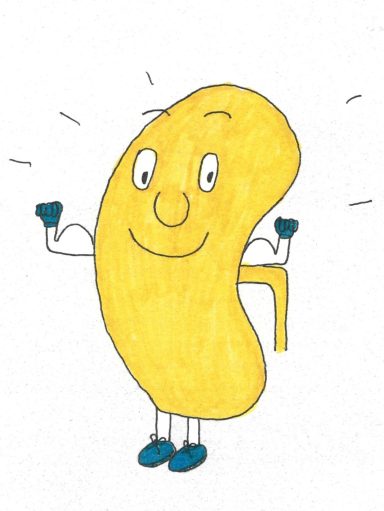Summary of EWOPA's History
The European Working Group on Psychosocial Aspects of Children with Chronic Kidney Disease (formerly: ...with Chronic Kidney Failure") has existed since the early 1970s.
In the late 1960s, pediatric nephrology began to develop as an independent sub-discipline within pediatrics. National and international scientific societies were founded and programmes for the treatment of children with kidney transplantation and hemodialysis were established in the first children's hospitals.
In August 1971, the Second International Symposium on Pediatric Nephrology was held in Paris, jointly with the 5th Annual Meeting of the European Society for Pediatric Nephrology (ESPN). Here it was decided to found the International Pediatric Nephrology Association (IPNA). (Read more..)
At this meeting, a round table was also held: "Psychosocial problems in children on hemodialysis and after transplantation". This was the birth of the European Working Group on Psychosocial Aspects (formerly EWG, now EWOPA). The group has since met once a year.
An important collaborator from the very beginning was the psychologist Ginette Raimbault. She worked with the pediatric nephrologist Pierre Royer at the Hopital des Enfants Malades in Paris and was one of the pioneers of psychosocial support for children with kidney disease. The psychosocial challenges against the medical background of the time, when only part of the children could be offered renal replacement therapy, are shown, for example, in her report "Psychological Aspects of Chronic Renal Failure and Haemodialysis" (1973).
From the beginning, many different professions were represented at the meetings: paediatricians, psychologists, social workers, nurses, educators, teachers, play therapists and others. The topics presented and discussed at the annual meetings reflected a wide range of holistic health care for children with kidney disease and their families. Evelyn Reichwald-Klugger, psychologist from Heidelberg, long-time activist for EWOPA and first chairperson of the coordination group, compiled the topics of the first years in an overview.
The locations of the annual meetings (here is the list) have reflected the breadth of countries and cities represented. Except for the years of the Corona Pandemic, they were held every year. Two of the annual meetings were joint meetings with ESPN (2014 in Porto and 2017 in Glasgow).
Discussion on the organisational structure of EWOPA
To this day, the Annual Meetings are the core of the EWOPA network. We have never been a fixed association with members and contributions, but an open network of colleagues working in paediatric nephrology who have been interested in the psychosocial aspects of patients and families. However, after the first decades there was a debate about what form of organisation and structure EWOPA should have: continued open network or fixed membership? Continued independent annual meetings or joint meetings with the ESPN annual meetings? In February 1998, Evelyn Reichwald-Klugger and Joachim Rosenkranz, psychologists from Heidelberg, invited to a structure meeting (minutes here). Participants included: Karl Schärer (Heidelberg), Tom Lennert (Berlin), Sue Rigden (London), Alan Watson (Nottingham), Ulla Berg (Stockholm), Ki Lindqvist (Helsinki). Together it was decided to keep the open structure. However, a coordination group was set up to coordinate further development and planning of the annual meetings.
The first coordination group consisted of:
Evelyn Reichwald-Klugger, Pediatric Psychologist, Heidelberg (Chairperson)
Michel Foulard, Pediatric Nephrologist, Lille
Helena Kärrfeld, Social Worker, Stockholm
Ki Lindqvist, Nurse, Helsinki
During those years, the "congress president", i.e. host of the respective annual meeting, was also part of the coordination group.
Coordination Group
In the following years after 1998, there have been always committed colleagues who got involved in the coordination group and took turns. The composition of the professions remained representative of the multidisciplinary concern of EWOPA:
Sue Rigden, Pediatric Nephrologist, London (Evelina)
Beatrice Schnarwyler, Nurse, Zürich
Maud Dehennault, Pediatric Nephrologist, Lille,
Annika van Schantz, Nurse, Helsinki
In 2009, Evelyn Reichwald-Klugger handed over the role of chairperson to Chris Reid, Pediatric Nephrologist from Evelina Children's Hospital, London. (Read Chris Reid's appreciation of her significant contribution to the psychosocial care of children with kidney disease and her contribution to EWOPA here)
Chris Reid chaired the coordination group for 10 years, until 2019.He has remained active as an advisor to EWOPA ever since. (Read here the letter written by the current coordination group on his retirement in 2022, acknowledging his long and very dedicated contribution to the development of EWOPA)
This is the composition of the current coordination group:
Dirk Bethe, Pediatric Psychologist, Heidelberg (Chairperson since 2019)
Lore Willem, Pediatric Psychologist, Leuven
Robert Novo, Pediatric Nephrologist, Lille
Nancy Kamphuis, Medical Social Worker, Nijmegen
Elisa Ylinen, Pediatric Nephrologist, Helsinki
Elke De Bruyne, Pediatric Psychologist, Ghent
(Contact information see here)
The first annual meeting since the corona pandemic took place in June 2023, in Leuven, Belgium. The large attendance and the committed discussions showed how important it is to have an ongoing exchange about the psychosocial aspects of caring for children with kidney disease.
As the annual meetings can only take place once a year, we are currently trying to find new ways of collegial communication. A first virtual working meeting will take place in October 2023.
We cordially invite all interested colleagues to participate in the further development of EWOPA. Please feel free to send us your suggestions and contributions to the discussion!
Dirk Bethe
September 2023
Wir benötigen Ihre Zustimmung zum Laden der Übersetzungen
Wir nutzen einen Drittanbieter-Service, um den Inhalt der Website zu übersetzen, der möglicherweise Daten über Ihre Aktivitäten sammelt. Bitte prüfen Sie die Details und akzeptieren Sie den Dienst, um die Übersetzungen zu sehen.
